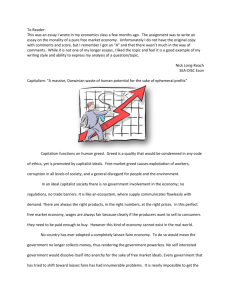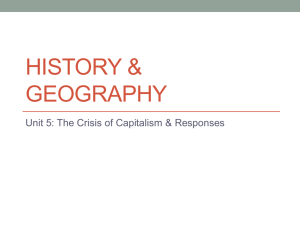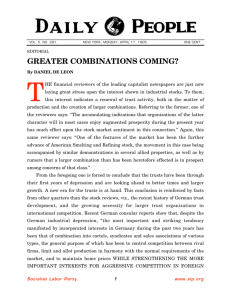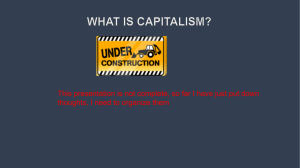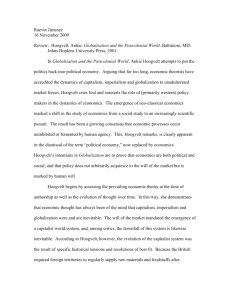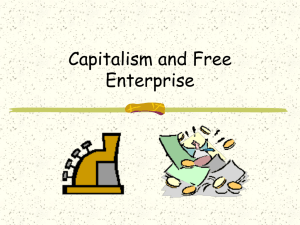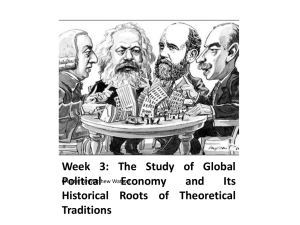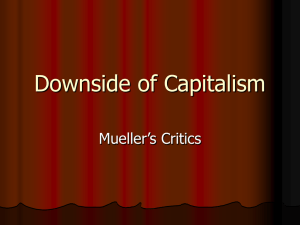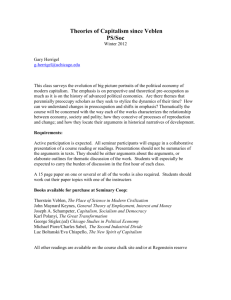"In Defense of Socialist Protectionism," panel on "Globalization and
advertisement
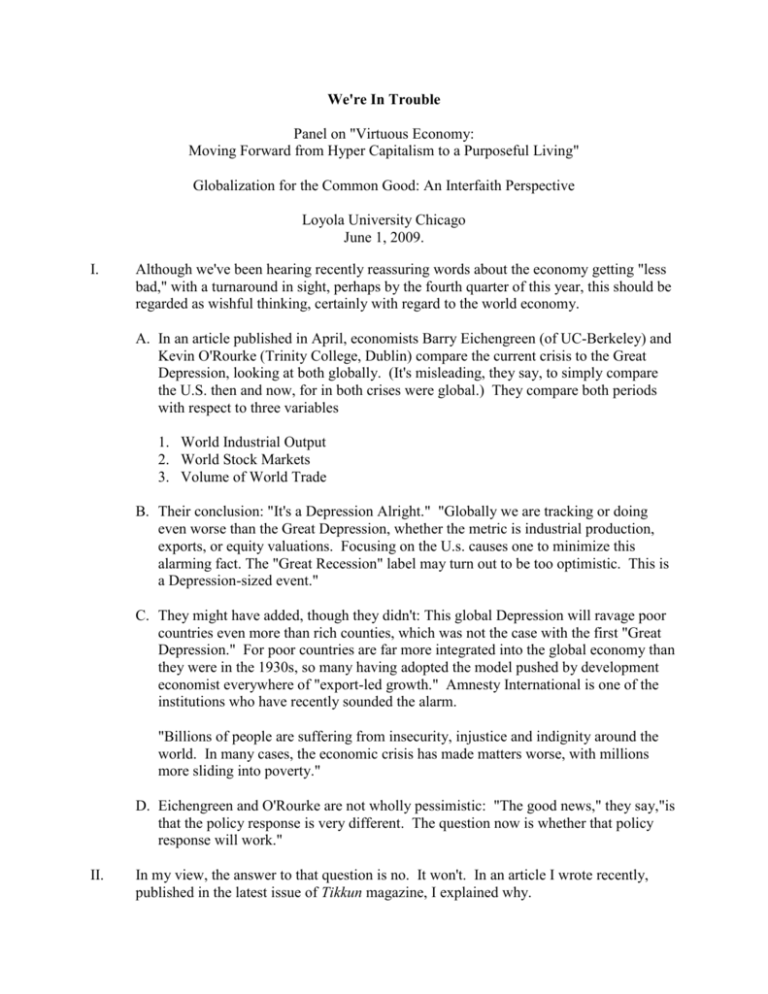
We're In Trouble Panel on "Virtuous Economy: Moving Forward from Hyper Capitalism to a Purposeful Living" Globalization for the Common Good: An Interfaith Perspective Loyola University Chicago June 1, 2009. I. Although we've been hearing recently reassuring words about the economy getting "less bad," with a turnaround in sight, perhaps by the fourth quarter of this year, this should be regarded as wishful thinking, certainly with regard to the world economy. A. In an article published in April, economists Barry Eichengreen (of UC-Berkeley) and Kevin O'Rourke (Trinity College, Dublin) compare the current crisis to the Great Depression, looking at both globally. (It's misleading, they say, to simply compare the U.S. then and now, for in both crises were global.) They compare both periods with respect to three variables 1. World Industrial Output 2. World Stock Markets 3. Volume of World Trade B. Their conclusion: "It's a Depression Alright." "Globally we are tracking or doing even worse than the Great Depression, whether the metric is industrial production, exports, or equity valuations. Focusing on the U.s. causes one to minimize this alarming fact. The "Great Recession" label may turn out to be too optimistic. This is a Depression-sized event." C. They might have added, though they didn't: This global Depression will ravage poor countries even more than rich counties, which was not the case with the first "Great Depression." For poor countries are far more integrated into the global economy than they were in the 1930s, so many having adopted the model pushed by development economist everywhere of "export-led growth." Amnesty International is one of the institutions who have recently sounded the alarm. "Billions of people are suffering from insecurity, injustice and indignity around the world. In many cases, the economic crisis has made matters worse, with millions more sliding into poverty." D. Eichengreen and O'Rourke are not wholly pessimistic: "The good news," they say,"is that the policy response is very different. The question now is whether that policy response will work." II. In my view, the answer to that question is no. It won't. In an article I wrote recently, published in the latest issue of Tikkun magazine, I explained why. 2 A. I argue that the root cause of the crisis is not 1. 2. 3. 4. the bursting of the housing bubble subprime lending deregulation Wall Street greed B. In essence, we are in the midst of a classic Marxian-Keynesian crisis that has been building for several decades: a massive shortfall of effective demand, due ultimately to the fact the past several decades workers have been compelled to compete with workers around the globe to see who would work for less. 1. It's the kind of crisis to which Marx called our attention when he pointed to a central contradiction of capitalism: On the one hand, since wages are a cost of production, every capitalist strives to keep wages down. On the other hand, capitalists need to sell their goods--which requires that workers have enough buying power to purchase them. 2. For several decades after WWII, an "historic compromise" between capital and labor permitted wages to keep pace with growing productivity--but globalization put an end to that. 3. For a long while, the crisis was held at bay, via the extension of vast amounts of credit to consumers. In effect, instead of paying workers ever higher wages, the capitalist class loaned them the money instead. But ever-increasing debt can't go on forever--as we now see. C. Unfortunately, there would appear to be no easy way out of this crisis, no way to return to that "historic compromise"--not with enterprises free to relocate and capital free to search the globe for optimal returns. III. And here’s the kicker: Even if we succeed in restoring the world economy to health, i.e., even if we succeed in getting it growing again, it'll be out of the frying pan, into the fire-for we are facing another crisis of massive proportion, namely environmental crisis. A. And the prescription for resolving this crisis is precisely the opposite of the one for resolving the economic crisis. You may recall the cover of Newsweek some weeks ago: "I WANT YOU TO START SPENDING! Invest in America -- Before It's Too Late." That is to say, to resolve the economic crisis we must spend, spend, spend. B. But as the ecologists tell us, it's precisely our "consume, consume, consume" that is killing the planet. If we are going to "save the planet," we need to cut back on our consumption, not expand it. As the economist Kenneth Boulding has observed, "Only a madman or an economist thinks exponential growth can go on forever in a 3 finite world." Yet a healthy economy requires ever-increasing consumption. A healthy capitalist economy, that is. C. Notice: if rich countries cut back on consumption, poor countries suffer--for their economies are geared to satisfying rich-country demand. That's what "export-led growth" is all about. Export-led growth is a perfectly rational strategy within the parameters of global capitalism. Make things for the people who have the money to buy them. To be sure, a just, sustainable world would require that rich countries scale back their consumption, while poor countries increase theirs--but there's no way that this happy outcome can come about so long as the iron laws of global capitalism prevail. IV. I'm not the only one who thinks this. Six weeks ago Nobel laureate, Amartya Sen, writing in the New York Review of Books about the European conference on “A New Capitalism,” hosted by Nicolas Sarkozy and Tony Blair, raised a question rarely asked in polite company, "Should we search for a new capitalism or for a "new world". . . that would take a different form?" This question recalls Sen's observation a decade earlier "The big challenges that capitalism now faces in the contemporary world include issues of inequality (especially that of grinding poverty in a world of unprecedented prosperity) and of "public goods" (that is, goods people share together, like the environment). The solution to these problems will almost certainly call for institutions that take us beyond the capitalist market economy." V. I submit that it's time to think seriously about "a new world," a world that transcends capitalism. As to what this new world might look like, well, that's a matter to which I've given much thought, and about which I will be speaking at other sessions in this conference. To give just a hint, the basic structure of a possible "new world" would look like this: 1. Retain competitive markets for goods and services 2. Democratize labor by extending democracy to enterprise governance 3. Democratize capital by nationalizing and rationalizing the financial structure VI. To have a democratic economy, we would have to change very little--and yet everything would change. We could have a full-employment economy vastly more egalitarian than our own which is immune to financial crises, and does not need to keep growing to remain stable. There's no time now to defend--or even elaborate these claims. For now, let me just leave you with a George Bernard Shaw quote: "Reasonable people adapt themselves to the world. Unreasonable people attempt to adjust the world to themselves. All progress, therefore, depends on unreasonable people." Reasonable people are trying to put Humpty Dumpty back together again. Reasonable admit that the order that has come unglued needs some modifications, a bit more 4 regulation, some tweeks here and there. But reasonable people find it unthinkable that our basic economic institutions are fundamentally flawed, unthinkable that there might be a better, more humane, more just, more sustainable way of organizing our national economies and the global economy in which these national economies fit. I submit that it's time to be unreasonable, to adjust the world to ourselves, to what is best in ourselves, to what we are capable of as decent, thoughtful human beings. Frankly, at this point in time, it is irrational to be reasonable. "Reasonable" solutions won't work. If we are to be rational, we must be unreasonable.

